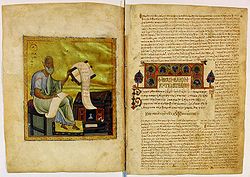Minuscule 569
| New Testament manuscript | |
 Portrait of Matthew Evangelist and the first page of the Gospel of Matthew | |
| Text | Gospels |
|---|---|
| Date | 1061 |
| Script | Greek |
| Now at | Russian National Library |
| Size | 26.2 cm by 19.3 cm |
| Type | Byzantine / mixed |
| Category | none |
Minuscule 569 (in the Gregory-Aland numbering), A 151 (in the Soden's numbering),[1] is a Greek minuscule illuminated manuscript Gospel book, on parchment. It is dated by a Colophon to the year 1061.[2] It was labelled by Scrivener as 475.[3] The manuscript has complex contents.[2]
Description
[edit]The codex contains a complete text of the four Gospels on 358 parchment leaves measuring 26.2 cm × 19.3 cm (10.3 in × 7.6 in). The writing is in one column per page, 14 lines per page for text and 51 lines with a commentary.[2] It contains breathings, sign of interrogative, abbreviations are frequent; the iota adscript occurs (e.g. article τῶι for τῷ), it has iotacistic errors; avoid hiatus (e.g. ἐγέννησε τὸν).[4]
Some initial letters are in gold or colour. It contains ornamented canon tables, tables of the κεφαλαια are placed before every Gospel, numerals of the κεφαλαια are given at the margin, the τιτλοι at the top, "hypothesis" (explanatory of using of the Eusebian Canons), στιχοι, Prolegomena, lectionary markings, Synaxarion, Menologion, four Evangelist portraits, and decorative head-pieces (in four colours).[5] The biblical text is surrounded by a patristic commentary (catena); in the Gospel of Mark it is a commentary by Victorinus of Pettau. There is additional material from Epiphanius.[5]
Text
[edit]The Greek text of the codex is a representative of the Byzantine text-type with some alien readings. Aland did not place it in any Category.[6] According to the Claremont Profile Method it represents the textual M27 group in Luke 1, Luke 10, and Luke 20.[7]
History
[edit]The manuscript was completed on 1 November 1061, by an unknown scribe. On folio 5 recto, Eugenius, a scribe, noticed, that in 1757 the manuscript was bought from Sophronius, a monk, in exchange for a promise to erect a chapel in honour of Saint Spyridon in the monastery of Saint Paul in Bulgaria.[4]
Ἔτει αψνξ (1757) ἀπὸ χριστοῦ τήνδε τὴν βίβλον ἐκτησάμην ἀντ’ αὐτης οἰκοδομἦσαι ὑποσχόμενος τῷ δόντι μοι αὐτὴν Σοφρονίῳ ἱερομονάχῳ παρακκλ..... ἐν τῇ κέλλῃ αὐτοῦ τῇ κατὰ τὴν ..... τοῦ ἁγίου Παύλου ἐπονόματι τοῦ θαυματόυργου Σπυρίδωνος Εὐγένιος ἱεροδίακονος ὁ Βόλγαρις[4]
Afterwards the manuscript belonged to the Załuski Library. In 1794 the whole collection was dispatched to Saint Petersburg. Since 1805 it has been held in the Imperial Public Library in Petersburg.[8]
The manuscript was examined and briefly described by Eduard de Muralt (along with the codices 565-566, 568, 570-572, 574, 575, and 1567), but he did not collate any of its readings. In 1966 Kurt Treu examined the manuscript more thoroughly for the needs of textual criticism.
The manuscript is in the National Library of Russia (Gr. 72) in Saint Petersburg.[2]
See also
[edit]References
[edit]- ^ Gregory, Caspar René (1908). Die griechischen Handschriften des Neuen Testament. Leipzig: J. C. Hinrichs'sche Buchhandlung. p. 68.
- ^ a b c d Aland, K.; M. Welte; B. Köster; K. Junack (1994). Kurzgefasste Liste der griechischen Handschriften des Neues Testaments. Berlin, New York: Walter de Gruyter. p. 80. ISBN 3-11-011986-2.
- ^ Scrivener, Frederick Henry Ambrose; Edward Miller (1894). A Plain Introduction to the Criticism of the New Testament. Vol. 1 (4 ed.). London: George Bell & Sons. p. 244.
- ^ a b c Eduard de Muralt (1864). Catalogue des manuscrits grecs de la Bibliothèque Impériale publique. Petersburg. p. 43.
{{cite book}}: CS1 maint: location missing publisher (link) - ^ a b Gregory, Caspar René (1900). Textkritik des Neuen Testaments. Vol. 1. Leipzig. p. 204.
{{cite book}}: CS1 maint: location missing publisher (link) - ^ Aland, Kurt; Aland, Barbara (1995). The Text of the New Testament: An Introduction to the Critical Editions and to the Theory and Practice of Modern Textual Criticism. Erroll F. Rhodes (trans.). Grand Rapids: William B. Eerdmans Publishing Company. p. 139. ISBN 978-0-8028-4098-1.
- ^ Wisse, Frederik (1982). The Profile Method for the Classification and Evaluation of Manuscript Evidence, as Applied to the Continuous Greek Text of the Gospel of Luke. Grand Rapids: William B. Eerdmans Publishing Company. p. 63. ISBN 0-8028-1918-4.
- ^ "Tetraevangelion with Commentary". National Library of Russia. Retrieved 2010-02-05.
Further reading
[edit]- Eduard de Muralt, Catalogue des manuscrits grecs de la Bibliothèque Impériale publique (Petersburg 1864), pp. 42–44.
- Kurt Treu, Die griechischen Handschriften des Neuen Testaments in der UdSSR; eine systematische Auswertung des Texthandschriften in Leningrad, Moskau, Kiev, Odessa, Tbiblisi und Erevan, Texte und Untersuchungen 91 (Berlin, 1966), pp. 54–57.
External links
[edit]- Minuscule 569 at the Russian National Library


 French
French Deutsch
Deutsch